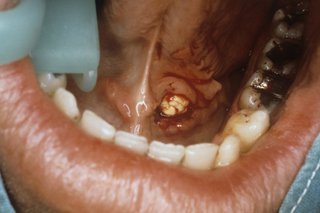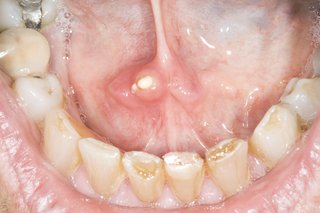Salivary gland stones are small stones that form in salivary glands in your mouth. They can block the flow of saliva. They are not usually serious and you may be able to remove them yourself.
Check if you've got salivary gland stones
Most stones appear below your tongue in one of the tubes (glands) supplying saliva to your mouth. You cannot always see them.


The stones may cause:
- dull pain in your mouth that comes and goes
- swelling in your mouth that flares up from time to time
- an infection around the stone
If you feel intense pain during mealtimes, this could mean the stone is blocking a saliva gland. The pain usually lasts 1 to 2 hours.
Things you can try yourself
You can try to remove the stone by doing things to increase saliva production, such as:
- sucking on a lemon or lemon drops
- drinking plenty of water
- massaging around the stone
If you have pain and swelling:
- take paracetamol or ibuprofen
- suck ice cubes or ice lollies
The symptoms will not go away until the stone has been removed.
Important
Do not use anything sharp to remove stones.
Do not use a sharp instrument to remove a salivary gland stone. This could cause injury and infection.
Non-urgent advice: Contact your GP if:
- you're unable to remove the stone yourself
- the stone has caused an infection – signs include pain, redness or pus around the stone, and a high temperature
Treatment to remove the stones
A GP may attempt to remove the stone with a thin, blunt instrument.
If that's not possible, you may need to have the stone removed in hospital.
You cannot prevent salivary gland stones
It's not clear what causes salivary gland stones, so there's no way to prevent them.
They're not generally linked with any other health problems.
Salivary stones do not usually come back. But if you keep getting them you might need to have one of your salivary glands removed.
Content supplied by the NHS and adapted for Ireland by the HSE
